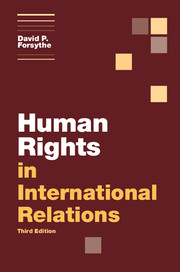Preface to the first edition
Summary
This book is intended for students interested in international relations. Rather than do a third edition of an earlier work of similar scope and purpose, I decided to start again from scratch. The changes in international relations have been so momentous, with the end of the Cold War and the collapse of European communism, that mere revisions seemed inadequate.
My emphasis is on political and diplomatic processes. I seek in general to show how and why human rights standards come into being, impact the notion of sovereignty, become secondary or tertiary to other values and goals, are manipulated for reasons other than advancing human dignity and social justice, and sometimes change behavior to improve the human condition. I use particular legal cases and material situations mainly to demonstrate the policy making processes associated with international human rights. I conceive of law and legal cases as derivative from politics and diplomacy, mostly. I make little attempt to summarize the substantive decisions of particular human rights agencies and courts, other than to give an indication of their general importance or irrelevance. My central objective remains that of giving the reader an overview of decision making processes pertaining to human rights in the context of international relations. I intend to give readers a framework of process, within which, or from which, they can plug in whatever changing particulars seem important.
- Type
- Chapter
- Information
- Human Rights in International Relations , pp. xi - xivPublisher: Cambridge University PressPrint publication year: 2012



